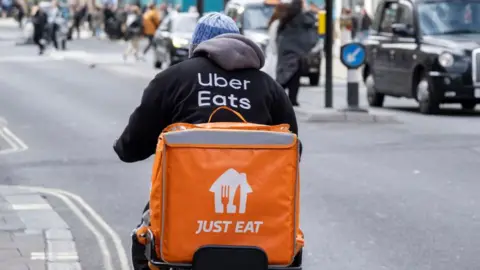In a decisive move to address the issue of illegal employment within the gig economy, prominent food delivery companies – Deliveroo, Uber Eats, and Just Eat – have announced plans to enhance security measures aimed at verifying the identities of their workers. This initiative follows concerning reports that some individuals, notably asylum seekers, have been found working illegally on these platforms. Under UK law, asylum seekers are prohibited from seeking employment within the first year of their application or until their claim has been fully processed, underscoring the urgency of this issue.
The primary objective of these new measures, as revealed by the involved companies, is to ramp up facial verification and fraud detection systems. By doing so, they aim to prevent unauthorized individuals from utilizing another person’s account to earn a living unlawfully. This move comes in response to government concerns that illicit account sharing is rampant, enabling unauthorized workers to exploit the delivery services for commercial gain.
Currently, many migrants reside in government-allocated asylum hotels and have been reportedly using such food delivery apps to make money. The UK’s Home Office has emphasized the need for these companies to take immediate action to mitigate the risk of continued illegal working within their operations. The delivery firms responded by committing to implement more stringent verification processes. Uber Eats and Deliveroo, for instance, are set to enhance their existing verification techniques, while Just Eat plans to conduct identity checks on a more frequent basis—shift from a monthly to a daily schedule.
The new checks are expected to be enacted within a 90-day period, signifying that swift action is prioritized within the food service industry. This commitment highlights the grave nature of the issue as the government’s growing scrutiny underscores the platforms’ responsibilities to ensure that only verified and legally eligible workers are engaged.
Dame Angela Eagle, serving as the minister for border security and asylum, articulated the government’s standpoint, stating, “This government will not turn a blind eye to illegal working,” adding that it not only undermines legitimate businesses but also adversely affects fair wages and supports the illicit operations of people-smuggling gangs. Through her statement, it becomes evident that the government is taking a hard stance on illegal employment practices that threaten the integrity of the marketplace and the welfare of genuine workers.
The delivery companies have previously instituted voluntary right-to-work checks for all their registered account holders. However, despite these measures, reports suggested that illegal activities persist. A recent investigation by The Sun pointed out how asylum seekers have been renting out others’ delivery accounts through social media, earning substantial amounts weekly. This claimed income raised alarm bells and highlighted the need for rigorous action to be taken against such systemic abuse.
In response to these developments, spokespeople from Deliveroo, Uber Eats, and Just Eat have affirmed their resolve to tackle this issue head-on. Deliveroo expressed its commitment to a zero-tolerance approach against platform abuse, while Uber Eats reiterated its dedication to investing in cutting-edge technology to combat illegal work. Just Eat also declared ongoing investments to maintain the integrity of its network.
Additionally, a government announcement in March signaled that all companies engaging gig economy workers must legally verify their eligibility to work in the UK. This law aligns gig economy employers with standard requirements across other sectors, ensuring robust compliance. Failure to conduct these checks could result in severe repercussions including fines, business shutdowns, and even potential prison sentences for directors liable for breaches.
The combined efforts of the government and these food delivery platforms illustrate a significant step towards securing fair employment practices within the gig economy. As the landscape evolves, the focus remains on curtailing illegal activity and fostering a system where both companies and their employees operate within the bounds of the law.











